In today’s digital landscape, having a well-designed mobile application is essential for businesses looking to enhance their presence and engage with customers effectively. Tokyo, Japan’s vibrant tech hub, hosts numerous talented mobile app development companies that offer exceptional services.
This article highlights three of the best mobile app development companies in Tokyo that can turn your ideas into reality.
Straight from Tokyo
Best Mobile Apps Development Companies in Tokyo, Japan
1. EPICs
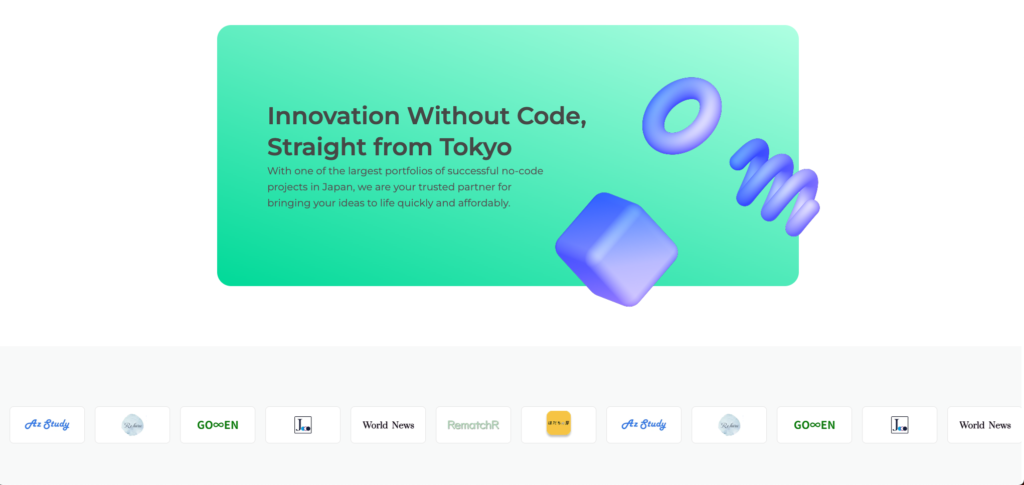
EPICs stands out as one of Tokyo’s premier no-code mobile app development agencies, specializing in creating innovative solutions without traditional coding. Their tagline, “Innovation Without Code, Straight from Tokyo,” encapsulates their unique approach to app development.
EPICs has established itself as a trusted partner for bringing ideas to life quickly and affordably, with one of the largest portfolios of successful no-code projects in Japan. Their expertise in the Japanese market allows them to create applications specifically tailored to local users’ preferences and needs.
Key Features
- Local Market Expertise: Tokyo-based agency with deep knowledge of Japanese market requirements
- Cost-Effective Development: Affordable services starting at just $3,000
- Rapid Turnaround: Delivers projects within a two-week timeframe
- Multi-Platform Capabilities: Expertise across Bubble, Adalo, FlutterFlow, and STUDIO
- Marketing Support: Comprehensive assistance for app launches in Japan
EPICs has successfully developed various applications, including “Hodachi no Me,” an e-commerce app connecting farmers with consumers; “JNAC,” a matching platform for freelance nurses and clinics; and “ICHIGEN,” a customizable business management app. Their commitment to affordable, fast, and quality no-code development makes them an excellent choice for businesses looking to establish a mobile presence in the Japanese market.
2. Rikkeisoft
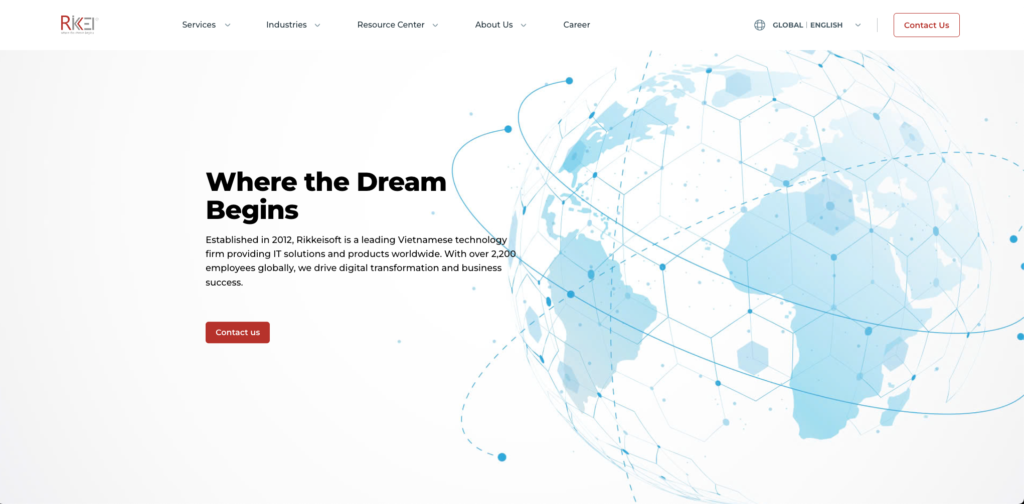
Rikkeisoft offers comprehensive mobile app development services focused on creating reliable applications that enhance services and motivate workforces across various industries. In today’s mobile-driven world, they understand that a streamlined mobile app is how businesses can connect with others effectively.
With over 1,000 worldwide projects, 500+ global clients, and 12+ years of experience, Rikkeisoft has established itself as a reliable partner in the mobile development space. Their team of 2,000+ IT experts ensures high-quality development across various tech stacks.
Key Services
- Mobile App Development Consulting: Comprehensive roadmaps for app ideation, design, and deployment
- Android App Development: Robust applications optimized for various devices and Android versions
- iOS App Development: Captivating apps that harness the power of the iOS ecosystem
- Cross-Platform Development: Versatile apps using frameworks like React Native and Flutter
Rikkeisoft follows a systematic six-step development process from discovery meeting to delivery and maintenance. They offer both Offshore Delivery Team and Project-Based Team structures to meet different business needs and budget requirements. Their services span across multiple industries including Finance, Retail & eCommerce, Automotive, Media & Entertainment, Logistics, Healthcare, Manufacturing, and Transportation.
3. LTS Group
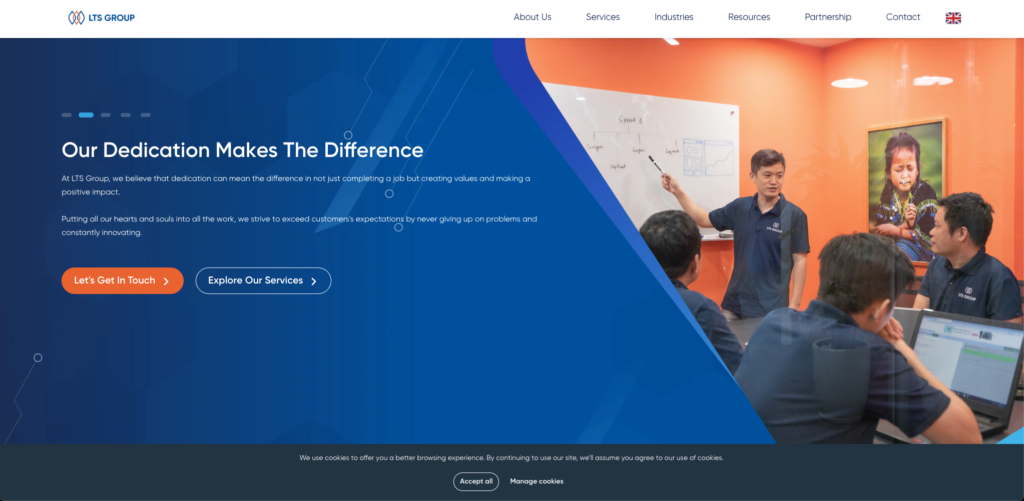
LTS Group specializes in developing feature-rich iOS and Android apps that help businesses increase customer engagement and loyalty through user-friendly, fast, and sleek mobile applications. They help companies stay ahead of competition by harnessing the power of mobile technology.
The company has achieved impressive milestones, including a 97% satisfaction rate, projects in 10 countries, 275 completed projects, and 61+ clients, demonstrating their reliability and expertise in mobile app development.
Service Offerings
- iOS App Development: Full-fledged applications that run smoothly across all Apple devices
- Android App Development: Native apps for phones, tablets, smart TVs, and smartwatches
- Hybrid App Development: Cross-platform solutions that optimize time and investment
- Comprehensive Technology Stack: Expertise in numerous front-end, back-end, and database technologies
LTS Group’s workflow follows a systematic approach from planning and analyzing requirements to maintenance, ensuring efficient project execution. They differentiate themselves through industry specialization, cost-effectiveness, an experienced talent pool, language competence (with engineers fluent in clients’ native languages), and a strong focus on security.
4. HIKESIYA
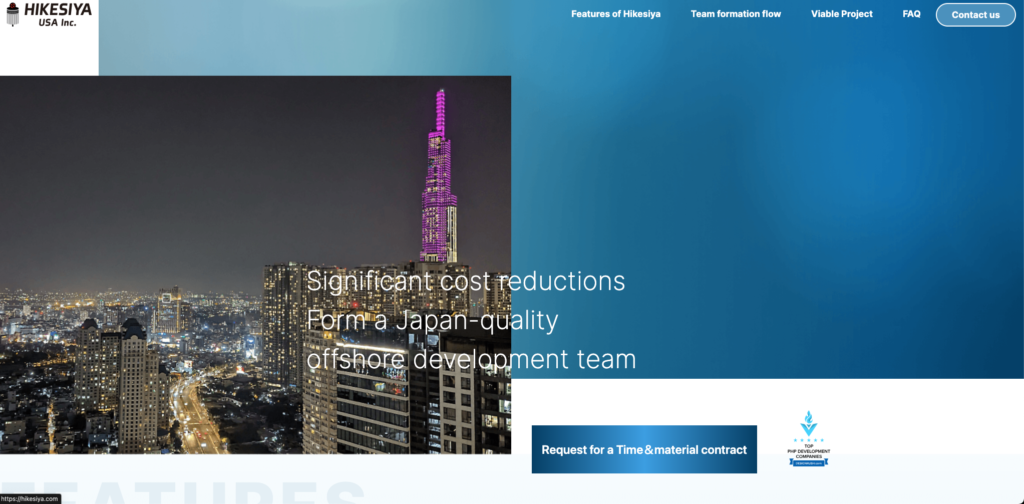
HIKESIYA offers an innovative offshore development model through their Time & Material contract approach, focusing on creating Japan-quality development teams at a significantly reduced cost. They serve as a bridge between Japanese business requirements and offshore development capabilities, ensuring high-quality results while maximizing cost efficiency.
Their approach allows companies to form offshore development teams without the typical challenges associated with international staffing. HIKESIYA has over 15 years of experience working with Japanese companies on offshore development projects, combining the technical expertise of offshore engineers with the quality standards expected in the Japanese market.
Key Features
- Cost Reduction: Engineer costs at less than half of typical staffing rates while preventing unnecessary expenses
- Team Organization: Quickly assemble development teams without interviewing, hiring, or skill-checking barriers
- Japan-Quality Assurance: Bridge engineers who speak Japanese and English, ensuring seamless communication
- Thorough Management: Stringent data security and complete one-stop shop for specific technology needs
HIKESIYA’s services cover multiple development areas including software development, mobile app development, web development, server maintenance and operation, data entry, and IT consulting. Their development environment supports numerous languages (JavaScript, PHP, .NET, C/C++, Python, Swift, etc.) and operating systems (Windows, macOS, Linux, iOS, Android).
The company claims clients can achieve up to 70% cost savings compared to hiring local engineers, with senior offshore engineers costing $18-36 per hour versus $79 per hour for U.S.-based senior engineers. Their contract model includes a 60-day trial period to ensure team compatibility before long-term commitment.
5. Zenware
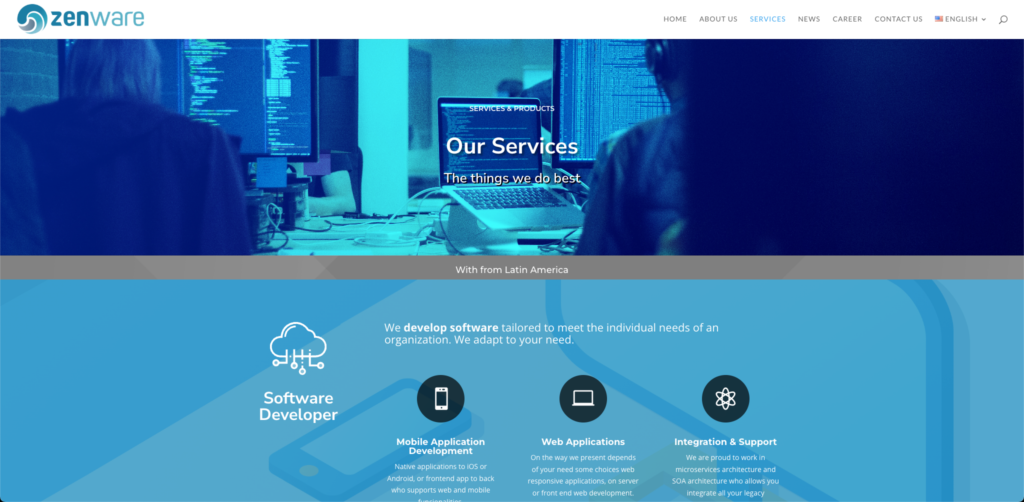
Zenware is a multinational development company with operations in Tokyo that specializes in software development with a strong focus on artificial intelligence integration. They offer a comprehensive suite of services designed to bridge traditional software development with cutting-edge technologies, helping businesses transform their digital operations.
The company follows a clear philosophy that emphasizes transparency throughout the development process. Their platform allows clients to check progress in real-time, view remaining tasks, and set priorities and deadlines, ensuring full visibility into project development at all times.
Service Offerings
- Software Development: Custom software tailored to meet specific organizational needs
- Mobile Application Development: Native iOS and Android applications as well as cross-platform frontend solutions
- Web Applications: Responsive web development with various architecture options
- Enterprise Architecture Solutions: Support for different architectural models including Monolithic, Microservices, and SOA
What truly sets Zenware apart is their expertise in next-generation technologies that can transform business operations. They offer artificial intelligence integration, machine learning solutions for image recognition and prediction, big data analytics for improved decision-making, and Internet of Things (IoT) implementation.
Their development process follows a six-stage methodology: Understanding (empathy and defining requirements), Exploring (ideation and prototyping), and Materializing (testing and implementation). This structured approach ensures that all projects align with client business goals while addressing end-user needs effectively.
Zenware has reported success stories from clients who have achieved significant operational efficiencies, including one client who saved 45% of operational process time after implementing their solution.
How to Choose a Mobile Apps Development Agency in Japan
Selecting the right mobile app development agency in Japan requires careful consideration of several factors to ensure your project’s success. The Japanese market has unique characteristics and consumer preferences that make local expertise particularly valuable for app development projects.
Define Your Project Requirements
Before approaching potential development partners, clearly define what you hope to achieve with your mobile application. Having a solid understanding of your project requirements will help you identify agencies with the right expertise for your specific needs.
Consider the type of application you need (native iOS, native Android, or cross-platform), the core features and functionalities, your timeline, and budget constraints. Also determine whether you need ongoing maintenance and support after the app launch, as this will influence your choice of agency.
Evaluate Technical Expertise and Specialization
Different mobile app development agencies in Japan have varying technical strengths and industry focus. Look beyond general capabilities to find an agency with expertise relevant to your specific project.
Technology Stack Proficiency
When evaluating potential partners, consider their experience with technologies that align with your project requirements. For native app development, check their proficiency in Swift/Objective-C for iOS or Kotlin/Java for Android. For cross-platform development, look for expertise in frameworks like React Native, Flutter, or Xamarin.
Many Japanese development companies specialize in specific industries or app categories. Agencies with experience in your industry will better understand your business context, user expectations, and regulatory requirements, resulting in more effective applications.
Communication and Language Capabilities
Effective communication is essential for successful project outcomes, especially when working with Japanese development agencies.
Language Proficiency Assessment
If you don’t speak Japanese, evaluate the agency’s English (or your preferred language) communication capabilities. Many top agencies in Tokyo offer multilingual services, but proficiency levels vary significantly.
- Project Management Communication: The English proficiency of your dedicated project manager
- Technical Discussions: Whether technical meetings can be conducted effectively in English
- Documentation Language: If specifications and documentation can be provided in English
- Translation Support: Availability of translators or interpreters if needed
Companies like EPICs and Rikkeisoft often emphasize their ability to work with international clients, suggesting they have staff members comfortable communicating in English.
Portfolio Review and Case Studies
A company’s previous work provides valuable insights into their capabilities and quality standards. Request to see examples of mobile apps they’ve developed, particularly those similar to your project in terms of functionality, industry, or technical complexity.
When reviewing portfolios, consider both the technical implementation and the user experience/interface design. Japanese developers often excel at creating visually appealing, intuitive interfaces that align with both local and global design standards.
Client Testimonials and References
Feedback from previous clients offers crucial perspectives on working with the agency. Look beyond the testimonials featured on the agency’s website by checking independent review platforms and requesting direct references.
Particularly valuable are references from clients with similar projects or from your industry. Agencies with long-term relationships with the same clients typically indicate high satisfaction and reliability in delivering ongoing value.
Benefits of Offshore Development with Japanese Companies
Japanese companies offering offshore development services provide unique advantages that combine Japanese quality standards with cost-effective development solutions. These hybrid models can offer the best of both worlds for many projects.
Cultural Bridge Between East and West
Japanese offshore development companies like HIKESIYA serve as an effective bridge between Western business practices and Eastern development capabilities.
Cross-Cultural Project Management
Japanese offshore development managers typically understand both Western business expectations and Eastern development approaches. This cultural bridging significantly reduces the communication gaps that often plague purely offshore projects.
Japanese project managers can effectively translate business requirements into technical specifications while maintaining the quality standards expected in the Japanese market. This ensures that offshore development teams deliver results that meet Japanese and international quality expectations.
Quality Assurance with Cost Efficiency
One of the primary advantages of working with Japanese offshore development companies is the combination of rigorous quality control with competitive pricing.
Japan-Quality Control Systems
Japanese offshore development companies implement the same meticulous quality control processes used in domestic development while leveraging the cost advantages of offshore resources. They typically establish the following.
- Standardized QA Processes: Rigorous testing protocols applied consistently across all development locations
- Bridge Engineers: Technical managers who ensure code quality meets Japanese standards
- Regular Code Reviews: Systematic evaluation of code against established quality metrics
- Comprehensive Documentation: Detailed specifications and documentation in multiple languages
Companies like HIKESIYA advertise significant cost savings (up to 70%) compared to hiring local Japanese engineers, while maintaining “Japan-quality” outputs through their management systems and experienced bridge engineers.
Access to Diverse Technical Expertise
Japanese offshore development companies typically maintain relationships with technical specialists across various technologies and domains.
Flexible Resource Allocation
These companies can quickly assemble teams with the specific technical skills required for your project, drawing from their networks of offshore developers. This flexibility allows them to scale resources up or down based on project requirements, often more efficiently than purely domestic teams.
Companies like Rikkeisoft emphasize their ability to “instantly organize a development team you need,” which can prevent missed opportunities due to staffing constraints or skill gaps.
Important Considerations for Offshore Development with Japanese Companies
While working with Japanese offshore development companies offers significant advantages, there are important considerations to keep in mind to ensure successful project outcomes.
Communication Protocols and Time Zones
Effective communication is crucial in any development project but becomes even more critical in offshore arrangements spanning multiple countries and time zones.
Establishing Clear Communication Channels
Before starting your project, establish clear communication protocols that address potential challenges. Consider regular video conferences at times that work for all team members, use project management tools with multilingual interfaces, and document all key decisions in writing to minimize misunderstandings.
Time zone differences can be both a challenge and an advantage. While real-time communication windows may be limited, the different working hours can enable “round-the-clock” development in some cases. Companies like HIKESIYA mention their ability to work across three time zones, potentially accelerating development timelines.
Cultural Understanding and Expectations
Japanese business culture differs significantly from Western approaches, particularly regarding decision-making processes, communication styles, and business relationships.
Decision-Making Timeframes
The consensus-based approach in Japanese business culture may extend decision-making processes beyond what Western clients might expect. Japanese companies typically consult multiple stakeholders before making significant decisions, which can affect project timelines.
Japanese business communication often emphasizes harmony and may avoid direct refusals or criticisms. This indirect communication style can sometimes lead to misunderstandings when working with Western clients who expect more explicit feedback. Understanding these differences helps set appropriate expectations for project communications.
Contract and Financial Arrangements
Offshore development arrangements require clear contractual frameworks and financial protocols to avoid complications.
Payment Structures and Methods
Prepare payment methods in advance to avoid delays. Japanese companies may have specific requirements for international transactions, and setting up proper financial channels before project initiation can save considerable time.
Consider using established international payment platforms, confirm the complete fee structure (including any conversion fees or taxes), and establish payment milestones tied to specific deliverables for greater transparency.
Many Japanese offshore development companies offer trial periods (like HIKESIYA’s 60-day trial) to ensure team compatibility before long-term commitment. These arrangements allow both parties to evaluate the working relationship before making substantial investments.

Leave a comment